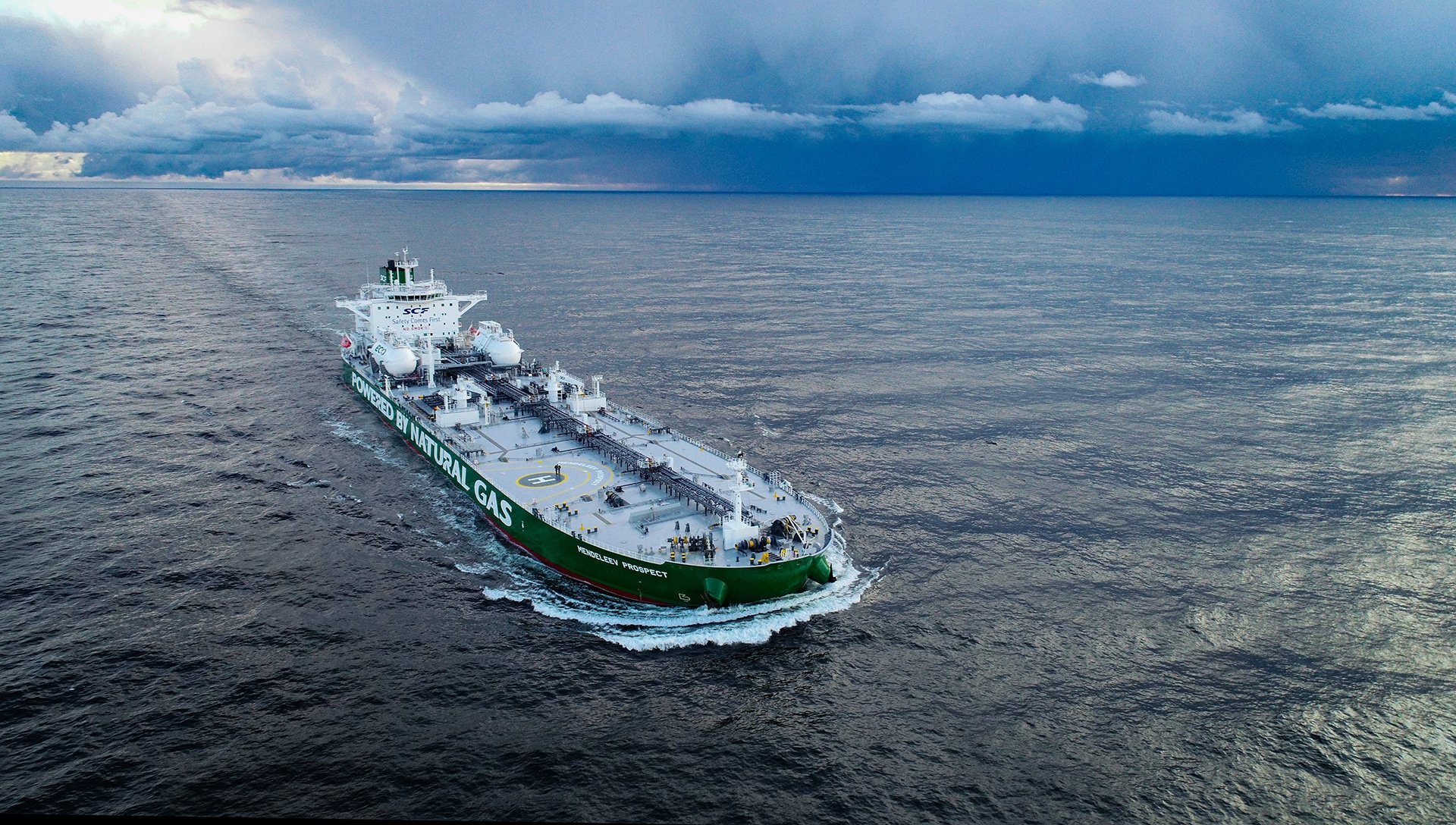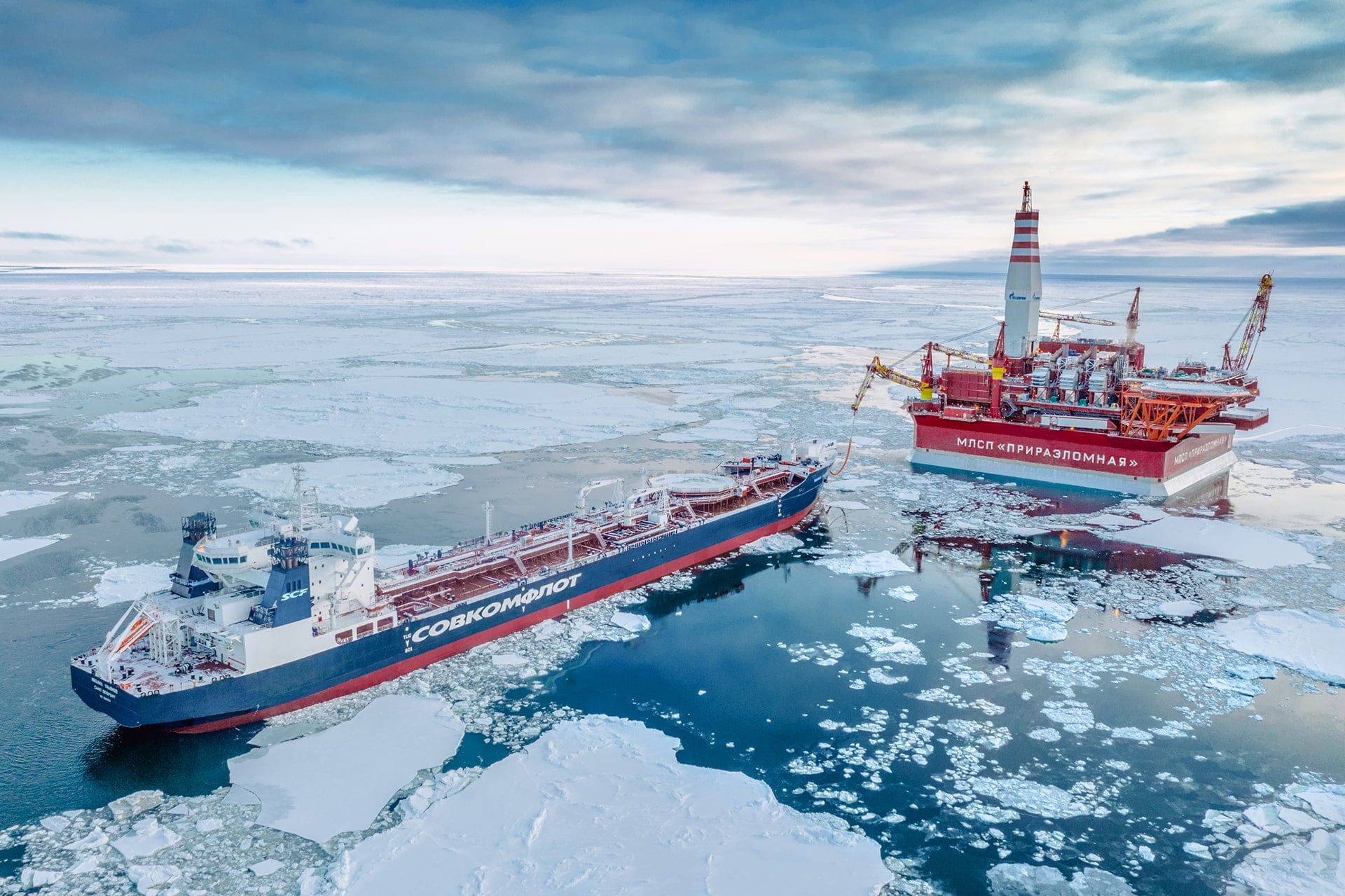Development strategy of Sovcomflot Group
In May 2019 the PAO Sovcomflot Board of Directors approved the Group Strategy for
The goal of Strategy 2025 is to maintain the Company’s global leadership and ensure its sustainable growth by further expanding the industrial portfolio with a focus on major Russian oil and gas projects.
Under the base case scenario underlying Strategy 2025, by 2025 the share of the fleet serving industrial projects under long-term charter contracts may reach 40-50%, with revenues from these vessels accounting for up to one-third of the Company’s total revenue.
In addition, Strategy 2025 outlines the main directions of the Group’s development:
- Maintaining the focus on energy shipping (crude oil, petroleum products and liquefied natural gas) and servicing of offshore hydrocarbon production;
- Further expanding the share of industrial business while focusing on the most profitable conventional business segments;
- Strengthening leadership in a number of key global market segments with an emphasis on serving major national projects in difficult climatic and ice conditions, as well transportation of liquefied gas for international projects of leading oil&gas companies.
Strategy 2025 also sets forth the Sovcomflot Group’s priorities in sustainable development: ensuring navigation safety, reducing adverse environmental impacts, implementing innovative technical and technological solutions, and continuously investing in human capital.

Strategy 2025 outlines the main directions of the Group’s development:
-
Maintain the Group’s leading position in the export of Russian hydrocarbons.
Given that Sovcomflot is included in the list of strategic enterprises and joint-stockcompaniesRussian Presidential Decree No. 1009 “On Approval of the List of Strategic Enterprises and Strategic Joint-Stock Companies” dated 4 August 2004. , the Group has an important role in the development of Russia’s energy sector. SCF estimates that the Group carried approximately 18% of the total oil and gas turnover at Russian seaports in 2020, including a significant portion of the crude oil produced from offshore production platforms along the Russian coasts. The Group’s strategy is to leverage its leading position to increase its market share in servicing Russian offshore upstream projects and exporting Russian hydrocarbons. Moreover, the Company intends to continue to develop the Group’s fleet to meet the particular needs of exports from Russia, such as increasing the number of specialist ice class vessels in the Group’s fleet. -
Expand the industrial business of the Group.
Sovcomflot intends to grow the percentage of its revenues which are derived from its industrial business, which has historically benefited from higher margins (see the Operating results section). The Group targets time charter equivalent revenue contribution by the industrial business of 70% by 2025. The segments making up the industrial business accounted for US$681.1 million, US$639.1 million and US$614.3 million, respectively, of the Group’s time charter equivalent revenues for 2020, 2019 and 2018. By investing in the industrial business, the Group will increasingly benefit from the long term and predictable cash flows from comprehensive service projects for major clients and an increase in demand for such service on new projects. In addition, SCF is also focusing on the further “industrialization” of the conventional business, with a view to benefiting from the long-term fixed-rate time charters typically entered into as part of its industrial business -
Develop as an integrated offshore upstream services provider with a specific focus on operating in harsh environments and the ice water conditions of the Arctic and sub Arctic regions.
The Group currently operates a technologically advanced fleet that is able to serve large scale integrated industrial projects, primarily in the Arctic and sub Arctic regions. These projects require highly specialised vessels and specifically trained crew, which provide significant barriers to entry to potential competitors, as well as premium charter rates compared to traditional tanker and offshore market segments. Further, the Group’s vessels servicing integrated industrial projects operate under long term contracts, typically for 10 years or more, which contributes to predictability of the Group’s cash flows. In addition, switching providers for such specialist services may entail additional costs, risks and delays for the charterer. As the largest owner worldwide of ice class tankers and a provider of diversified energy shipping services, the Company aims to leverage its integrated expertise to increase its share of the Russian market for offshore oil and gas services and to provide its highly specialised transportation services on large scale industrial projects. -
Maintain the Group’s status as a ‘preferred carrier’ for leading international and national energy companies by focusing on a diverse and high quality service offering while maintaining strong brand recognition associated with quality and safety.
The Group was the third largest oil tanker owner in the world by number of vessels, as of March 1, 2021, according to Clarksons Research, and the Company aims to maintain the Group’s status as a preferred carrier for both Russian and international energy companies. The Group’s large, modern and technologically advanced fleet, together with its integrated services offering, enable it to meet the varying and complex needs of international oil and gas companies. Moreover, the Group’s integrated services across the energy value chain enable it to expand its existing relationships with Russian and international oil and gas companies, becoming a single service provider for many of their energy transportation needs. The Company strives to enhance its reputation as a leader in safety management, which also increases the Group’s attractiveness to Russian and international charterers. -
Strengthen the Group’s market positions by renewing and expanding its fleet.
Sovcomflot intends to expand the number and types of vessels the Group operates in its core segments over the next several years. The development of the Group’s ice class fleet will allow the Group to retain its leading position in the Russian energy export market. Moreover, the Company plans to invest in additional highly specialised shuttle tankers, LNG carriers and supply vessels designed to operate in the harsh environment and ice water conditions of the Arctic and Far Eastern regions of Russia to provide integrated offshore services. In addition, it plans to selectively invest in the renewal of the Group’s tanker fleet. -
Focus the Group’s investment policy on the needs of core Russian and international oil and gas clients.
The Group’s investment programme has been designed to focus on the needs of the Group’s core customers, with a particular emphasis on long term industrial projects that can deliver predictable cash flows, particularly in the Baltic, Arctic and Far Eastern regions of Russia, where the Group has competitive advantages due to its expertise in operating in harsh environments. The Company intends to remain consistent as regards the size of its annual investments in the coming years, with a particular focus on the growth of the industrial fleet. At the same time, it expects to make periodic capital expenditures in the renewal of the crude and product tanker fleet.
-
Increase the reliability and environmental sustainability of the Group’s fleet.
The Group’s environmental protection policy is an integral component of its overall safety management system established in accordance with the International Management Code for the Safe Operation of Ships and for Pollution Prevention (the “ISM Code”), which lays down the principles, goals, objectives and key areas of the Company’s environmental safety activities, and encompasses the activity of all employees of the Group, from ships’ crews to top management. In March 2019 the SCF Group’s Green Charter, a declaration of commitments on sustainable development, was approved. (For more details, see the Sustainable development section of this report). The Group is dedicated to reducing the carbon footprint of its fleet without eroding returns. The Group also intends to continue implementing energy saving technologies and to use transparent energy consumption calculation methods
